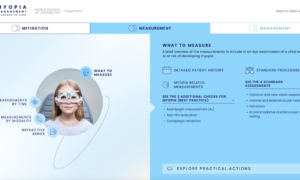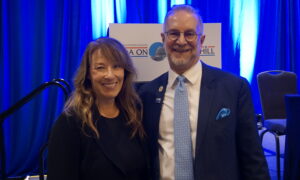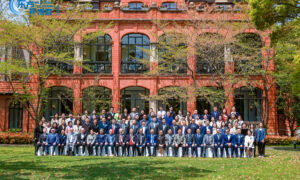April 15, 2024
By Jamie Brosof, OD
The first step in our office is starting the conversation about myopia management with my patients who are parents — especially if the parents are myopic. My goal with these conversations is to strongly encourage them to bring their kids in for a comprehensive eye exam.
I started working in optometry as a technician at my father’s practice in Philadelphia when I was 16 years old. It began as an after-school job, and at the time, I had no intention of pursuing optometry as a career. However, that experience ultimately led me to the eye care field for the rest of my professional life. After graduating from NECO in 2018, I worked a few independent contracting jobs, both private and corporate, before joining my father — at what is now our practice — full-time in 2020.
Prescribing Myopia Management
I was first introduced to myopia management as a student under Dr. Fuensanta Vera-Diaz at NECO. As a -9.00D myope myself, I immediately knew this was an area of optometry I would be incorporating into my practice. I put my first myopic pediatric patient into VTI’s NaturalVue Multifocal 1 Day contact lenses with the goal of myopia management in early 2019. He is 16 years old now, still wearing the lenses, and is stable to his original prescription from 2019!
Initially, I did not have a separate myopia management protocol as part of my practice. If I felt a patient would benefit from myopia management, I would speak to the patient and parents and work together to formulate a treatment plan. I created a brochure for parents that discusses risks associated with myopia, their child’s risk, and myopia management options. I also continued to improve my education by attending myopia management CE and became certified with CooperVision’s MiSight 1 day contact lenses in 2021.
As of now, I mainly offer multifocal soft contact lenses to my myopic children, and in limited cases, low-dose atropine. I plan on starting to offer orthokeratology lenses soon, and I can’t wait for the FDA to approve some of the next-generation spectacle lens options we’ve seen other countries benefit from over the last few years.
Creating a Treatment Plan
Over the last few years, we’ve created a standard myopia management treatment plan that can be altered as needed for each child. The starting point is always distance center multifocal soft contact lenses, as I feel the evidence is strongest for this treatment method. However, the lens we choose depends on the child and their parents. I usually prescribe either MiSight or NaturalVue Multifocal 1 Day, but I’m willing to reach for other brands for kids with high cylinder, and/or parents who are particularly cost-conscious. In cases where soft contact lenses just are not an option for whatever reason, I prefer low-dose atropine over no action at all.
I’m open to combination therapy, when necessary, but I’ve been lucky that nearly all my distance-center soft contact lens kids have been stable or mostly stable with their solo treatment.
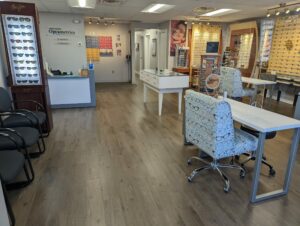 |
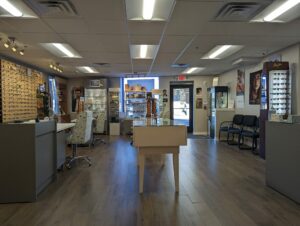 |
Dr. Brosof’s office, Pennsylvania Optometrics, treats patients of all ages, though she talks to all parents about myopia.
Talking with Parents Paves the Way
Our patient population skews older, even though we know there are a lot of kids in our neighborhood. So, the first step in our office is starting the conversation about myopia management with my patients who are parents — especially if the parents are myopic. My goal with these conversations is to strongly encourage them to bring their kids in for a comprehensive eye exam.
Once I’ve seen the child and determined they’d likely benefit from myopia management, I talk to both the parent and child about our myopia management program and provide them with our brochure, some reading material provided by CooperVision, and the outline of our office’s myopia management plan. I’ve found the most helpful part of the conversation is stressing how dangerous myopia can be — beyond just needing thick glasses. Most parents don’t know why myopia management is important. Once they understand, I find that they almost always come back to initiate myopia management for their child.
The most significant barrier I’ve found to myopia management is getting children into my chair. So many parents think that if their child passes a school screening and/or their pediatrician’s vision screening, their child does not need to be seen by an actual eye doctor. Talking to parents and making them aware of the AOA recommendations for when children should have eye exams has been very helpful. I plan to reach out to local school nurses to hopefully create partnerships that will allow more children to be seen and treated for juvenile-onset myopia, binocular vision dysfunctions, or any other visual disorder. I’m excited to see how that shapes our myopia management practice moving forward.
Preventing Myopia
In an ever-changing industry, staying current on the latest myopia management research and clinical findings is crucial. Attending myopia-related CE courses is always beneficial for ECPs, as is keeping an eye out for articles in publications like Review of Myopia Management, Review of Optometry, and Optometry Times. I also stay active in different Facebook groups where I can learn from and engage with other ODs offering myopia management. In fact, I recently attended a six-hour myopia management CE event with PECAA!
I would love to see, in my lifetime, the reversal of the myopia epidemic. I am cautiously optimistic that we may get to see it if we can make myopia management the standard of care over single-vision glasses and/or contacts for myopic children. Myopia management is headed not only toward becoming the standard of care but also identifying pre-myopic children and initiating management practices before they can even become myopic at all. As they say, an ounce of prevention is worth a pound of cure!
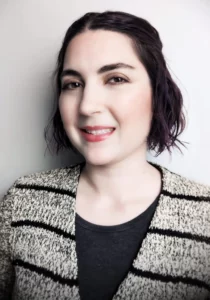 |
Dr. Jamie Brosof is a a proud second generation optometrist at Pennsylvania Optometrics. She received her Doctorate of Optometry from the New England College of Optometry in 2018 as a member of the Beta Sigma Kappa honors society after first completing her Bachelor of Science summa cum laude in pre veterinary medicine at the University of Rhode Island. Dr. Brosof’s areas of optometric interest include glaucoma, dry eye, and myopia management. She is a member of the American Optometric Association, the Pennsylvania Optometric Association, and the Bucks Montgomery Optometric Society. Outside of the office, Dr. Brosof lives with her husband, their rescue dog, and their two rescue cats. When not volunteering her time to animal rescue, Dr. Brosof enjoys sewing, gardening, and continuing her study of vocal performance. And of course, Dr. Brosof is an avid Philadelphia sports fan who loves to travel to support her teams whenever she gets the chance. |





